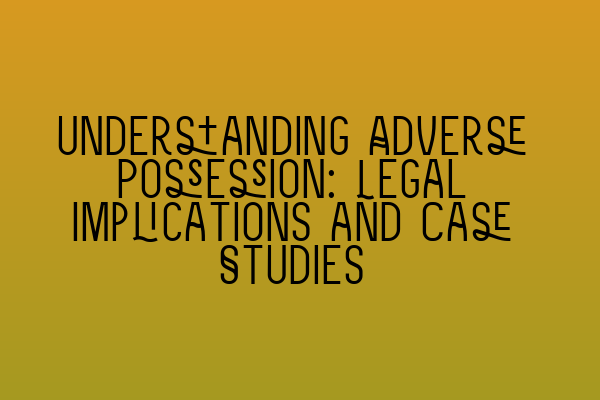Understanding Adverse Possession: Legal Implications and Case Studies
Introduction
Adverse possession is a legal concept that allows a person to claim ownership of someone else’s land based on continuous and uninterrupted possession for a specified period of time. This legal doctrine has its roots in common law and has evolved over the years to address the complexities of property ownership. In this blog post, we will explore the legal implications of adverse possession and delve into some interesting case studies to provide a comprehensive understanding of this fascinating area of property law.
Legal Implications of Adverse Possession
To fully comprehend the legal implications of adverse possession, it is crucial to grasp the essential elements required for a successful claim. These elements typically include:
1. Actual possession: The claimant must demonstrate physical occupation and control over the land in question. Mere occasional use or occasional presence may not be sufficient to establish adverse possession.
2. Exclusive possession: The claimant must exercise exclusive possession, meaning that others should not have access to or control over the land.
3. Open and notorious possession: The possession must be overt and obvious to the true owner and anyone else who might have an interest in the land.
4. Hostile possession: The claimant’s possession must be without the true owner’s permission. However, hostility does not necessarily imply an animosity-based confrontation, but rather an occupation inconsistent with the true owner’s rights.
5. Continuous possession: The claimant must demonstrate continuous possession of the land for a specified period, which varies depending on the jurisdiction. In the UK, the period is typically 12 years.
Case Studies
To shed light on the practical application of adverse possession, let’s explore some real-life case studies:
1. Case Study 1: The Fence Dispute
In this case, Mr. Smith and Mr. Johnson live adjacent to each other. There has been a dispute regarding the location of the boundary fence between their properties. Mr. Smith argued that the fence had been in its present location for over 20 years and should be considered the new boundary, based on adverse possession principles. However, Mr. Johnson maintained that the fence was accidentally misplaced during a renovation project and should be moved back to its original position. After careful consideration of the evidence presented, the court ruled in favor of Mr. Smith, acknowledging his adverse possession claim due to the continuous use of the land in question.
2. Case Study 2: The Neglected Garden
In this case, Ms. Brown owned a property with a large garden. However, she neglected the garden for many years, and it became overgrown. Meanwhile, Mr. Green, who lived next door, took it upon himself to maintain the garden and treated it as his own. After the statutory period of adverse possession had elapsed, Mr. Green successfully claimed ownership of the neglected garden. The court considered his continuous and exclusive possession of the land, as well as his open and notorious use in maintaining the garden.
Conclusion
Adverse possession is a complex area of property law that requires a careful examination of the legal principles and factual circumstances involved. The concept provides a means for individuals to acquire ownership of land through continuous and uninterrupted possession. However, it is essential to consult a qualified legal professional when dealing with adverse possession cases to navigate the intricacies of the law effectively.
For further resources on property law and preparing for the SQE exams, check out the following related articles:
– SQE 1 Practice Exam Questions
– SQE 1 Practice Mocks FLK1 FLK2
– SQE 2 Preparation Courses
– SQE 1 Preparation Courses
– SRA SQE Exam Dates
Remember, understanding adverse possession is crucial for anyone dealing with property law, and staying informed on legal concepts is always a valuable asset in the legal field.
